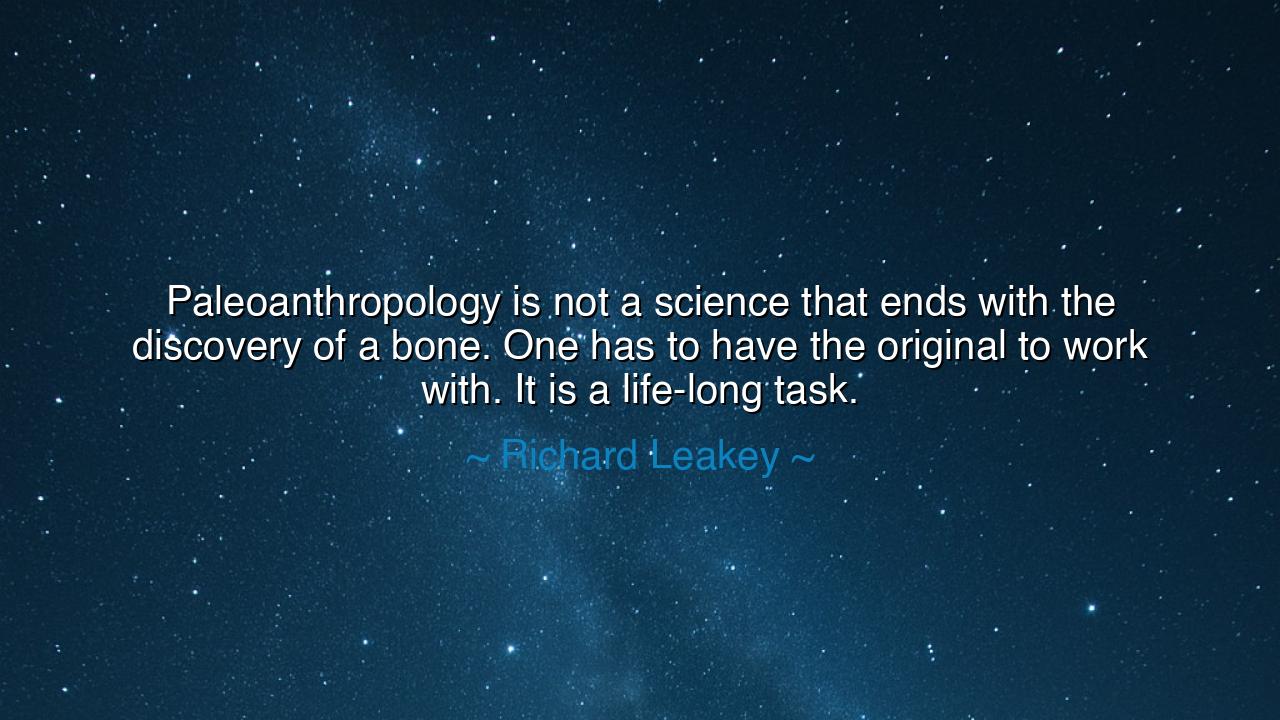
Paleoanthropology is not a science that ends with the discovery
Paleoanthropology is not a science that ends with the discovery of a bone. One has to have the original to work with. It is a life-long task.






Hear now, O seekers of wisdom, the words of Richard Leakey, whose voice rings out with a truth that cuts to the very heart of the pursuit of knowledge. He said: “Paleoanthropology is not a science that ends with the discovery of a bone. One has to have the original to work with. It is a life-long task.” These words carry with them the weight of a profound understanding: that the pursuit of knowledge, particularly in the field of paleoanthropology, is not a simple matter of collecting scattered artifacts and bones, but a deep, relentless search for the truth of human origins that can span a lifetime.
What, then, do these words mean, O children of wisdom? Leakey speaks to the very nature of scientific discovery—that it is not enough to stumble upon a single bone or artifact and assume the journey is complete. Paleoanthropology, the study of ancient humans and their ancestors, requires more than just collecting fossils; it requires a lifelong commitment to piecing together the puzzle of our origins, understanding the context, and interpreting the evidence in the light of evolving discoveries. One single bone is but a fragment of a greater story, and to truly understand the story of human evolution, one must be dedicated to decades of study, reflection, and discovery.
Consider the story of Louis Leakey, the father of Richard Leakey, whose own relentless pursuit of knowledge about the origins of humanity led to some of the most important fossil discoveries of the 20th century. In Olduvai Gorge, Louis Leakey and his team uncovered some of the earliest evidence of human ancestors, including the famous discovery of the Zinjanthropus skull in 1959. But Louis Leakey understood that a single discovery could not tell the full story. Paleoanthropology, he knew, was not about finding isolated pieces of evidence; it was about continuously seeking out more, interpreting the evidence, and making sense of the complex history of our ancestors. This understanding was passed down to Richard Leakey, who continued his father’s work and made his own groundbreaking discoveries in Africa, including the famous Turkana Boy, a nearly complete skeleton of a young Homo erectus. These discoveries were not ends in themselves, but beginning points—milestones on the journey toward understanding human evolution.
The lesson, O children, is this: True understanding does not come from isolated moments of discovery, but from the commitment to the journey—the relentless pursuit of knowledge, even when the answers seem just out of reach. Leakey’s words remind us that the path to knowledge, whether in paleoanthropology or in life itself, is not a short-term task that ends with one breakthrough. It is a lifelong commitment, a dedication to understanding and unraveling the mysteries that surround us, step by step, over the course of many years. Just as a single bone can provide only a glimpse of the past, so too can a single experience or piece of knowledge offer only a fragment of the larger truth.
Think, O children, of the journey of Charles Darwin, who spent years observing, collecting, and reflecting on the evidence for his theory of evolution. His discovery did not come in a moment of brilliance, but through years of study, questioning, and synthesizing the information he gathered during his travels on the HMS Beagle. Darwin’s theory of evolution was the result of a lifelong task—a journey of discovery that did not end with the observation of a single organism or species, but unfolded over many years of observation and careful reflection. The pursuit of knowledge, like the study of paleoanthropology, is a journey, not a destination. It is an ongoing process that requires both patience and perseverance.
So, O children, remember this truth as you walk your own paths: The pursuit of knowledge is not a race to be won but a journey to be undertaken. Whether you seek to understand the origins of humanity or the depths of the human soul, understand that true wisdom comes not from fleeting moments of discovery but from the commitment to a lifelong task. Just as Richard Leakey dedicated his life to the study of human ancestors, so too must you dedicate yourselves to the pursuit of wisdom, knowing that it is a journey without end. Each discovery, each insight, will build upon the last, leading you toward a deeper understanding of the world and your place in it.
Let your hearts be filled with the determination to continue the search, no matter how long or difficult the journey may seem. Like Leakey, like Darwin, and countless others before you, embrace the challenge of seeking knowledge that extends beyond the surface, diving deep into the mysteries of the world. Know that every step you take, every question you ask, every discovery you make, is part of the great journey of understanding. And though the answers may not always come quickly or easily, it is the commitment to the search—the lifelong dedication to discovery—that will lead you to the truths that shape the world.






AAdministratorAdministrator
Welcome, honored guests. Please leave a comment, we will respond soon